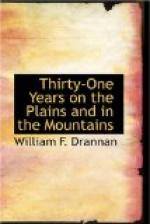We were treated with the greatest respect while at this place, and were asked many questions by the other guests relative to the Modoc war, the capturing of Captain Jack, etc., and the following morning quite an article came out in the Chronicle concerning George Jones and myself relative to the position we held in the Modoc war.
We remained there until the last day of December, on which day we started again on our journey for Arizona, via Salinas, Santa Barbara and Los Angeles. Here we lay over and let our horses rest four days, after which we proceeded on our journey via San Diego, which at that time was a very small place. From there we struck for the Colorado river and followed down the river to Fort Yuma.
This route we took in order to avoid crossing any of those sand deserts. We were about five weeks making the trip, and reached Fort Yuma without any accident or mishap whatever, and learned that the Indians were worse in Arizona than when we left them several years before, as they were most all armed with rifles, instead of bows and arrows, and many of them had pistols.
Lieut. Jackson told me he had lost more men the last year out than in any other two seasons since he had been in Arizona. He had received orders to take four hundred cavalrymen and one hundred infantrymen and go into the mountains and follow the Indians from place to place the coming season. The Lieutenant told me that there had been a settlement started the last year about ninety miles from the line of Arizona and Sonora, Mexico, and they were not only troubled with the Indians, but the Mexicans also came in there and stole their stock and run it across the line.
Gen. Crook was still in charge of the command, and wanted me to accompany Lieut. Jackson, saying: “I do not expect you to do any hard service yourself, but want you to take charge of the scout force and handle it to suit yourself.”
If my memory serves me right, it was in the latter part of March, 1875, when we made the start for the mountains. For the first hundred miles our supplies were hauled on wagons, but the balance of the way they had to be packed on animals.
On our way out we passed near Salt River Valley, that being settled up now with Americans. I started to ride out to the settlement to ascertain something of the nature of the depredations committed there lately. I dressed in teamster’s clothing and tied a pair of blankets behind my saddle before starting to the settlement. It was late in the evening, just about sunset, and I was riding leisurely along, being within six or seven miles of the settlement, when suddenly I came upon three Mexicans, just cooking supper. They saw me as quick as I saw them, and I thought I was in for it. I was too near them to attempt to get away, so all that I could do was to make the best I could of it, take my chances and trust to luck. When I rode up I spoke to them in my own language and one big burley looking Mexican said: “No indetenda English,” meaning I don’t understand English. They then asked me in their tongue if I spoke Spanish, which I understood as well as they did, but I shook my head as if I could not understand a word they said.




